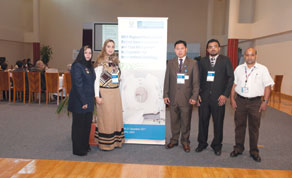 |
| Dr al-Naemi (second left) with some of the participants at the workshop |
Participants comprising some 15 medical physicists and technicians from HMC and another 17 delegates from countries such as the UAE, Oman, Kuwait, Iran, Lebanon, Malaysia, Singapore, Nepal, Sri Lanka and Thailand attended the event.
The IAEA workshop was conducted by three leading international experts namely Dr Madan Rehani, Medical Physicists and chairman of the project, medical physicists - Dr Renato Padovani and Dr Loannis Damilakis.
The workshop was part of a project, which IAEA started in 2005 as a collaborative effort of more than 20 countries worldwide.
Qatar has recently joined the project in 2010.
It is part of the international body’s initiative to ensure quality control and quality assurance for radiation equipment in the medical field and the workshop gave the participants an opportunity to update their knowledge about international norms and specifications in patient radiation doses and assessment.
Speaking about the workshop, HMC Occupational Health and Safety (OHS) executive director and the course director Dr Huda al-Naemi said: “The main objective of this workshop is to train medical physicists and technicians, so that they make sure that when a patient comes for any diagnostic examination at any hospital they do not receive more radiation dose than is required just to get a good image for examination.”
She further explained the importance of the workshop saying the risk of high radiation dose during examination can have adverse effect on the biological tissue and can lead to cancer, cataract and other complications later on in patient’s life.
“Patients are not aware that during diagnostic examination such as CT scan, fluoroscopy and others, the patient gets massive radiation. So correct and proper radiation dose is paramount to optimise patient protection, which is the main responsibility of radiation safety section at OHS department,” Dr al-Naemi pointed out.
She also said that HMC, keeping with international safety norms, had conducted regular survey for calculating and assessing radiation dose and safety, the effort she said has helped in better calibration of patient radiation dose and improved diagnostic examination and imaging at the hospitals.
“Through this important meet, Qatar can also move on to setting up National Patient Dose Guidelines, Dr al-Naemi said while thanking HMC leadership and the Ministry of Environment, which is the focal body dealing with IAEA for holding the project in Qatar.

